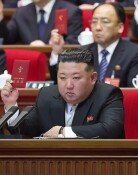Health insurance populism is turning into plunder
Health insurance populism is turning into plunder
Posted May. 21, 2025 07:21,
Updated May. 21, 2025 07:21
When it comes to elections, there’s no easier pot of money to tap than national health insurance. It’s tied directly to two of the public’s most sensitive concerns: medical bills and personal health. Politicians promise expanded coverage, and voters reward them at the ballot box.
This time, the focus is on caregiving costs. Both Lee Jae-myung of the Democratic Party and Kim Moon-soo of the People Power Party have pledged to include caregiving expenses under the national health insurance plan. Caring for aging parents in nursing hospitals is a burden that could fall on anyone, making the proposal instantly appealing. The logic — “I’ll use my premiums to pay for my parents’ care” — sounds reasonable and justifies the policy for both politicians and voters.
But if health insurance is to be used as a tool of filial duty, then a clear plan for securing funding and sharing responsibility must come with it. Without that, these feel-good campaign promises risk turning an essential safety net into a vehicle for future-destroying plunder.
The biggest problem with the caregiving pledge is its lack of consideration for long-term sustainability. The national health insurance system is already projected to run a deficit of about 300 billion won next year. By 2028, the annual deficit is expected to surpass 1.6 trillion won, with the reserve fund completely depleted. Even if coverage is limited to only the most severe patients (levels 1 to 3 out of 5) in nursing hospitals, the cost would still exceed 15 trillion won a year. At this rate, worrying about the National Pension going broke by 2064 feels almost like a luxury.
There’s a reason politicians keep pulling out the health insurance expansion card every election season. First, they win votes by promising more benefits. Then, once the budget starts bleeding, they simply raise premiums. Unlike tax hikes, premium increases don’t require a law or parliamentary approval — the government can adjust the rate on its own. And if even that risks backlash, the problem can be handed off to the next administration. Political accountability fades while votes are secured. What could be more tempting?
No administration, conservative or progressive, has resisted this temptation. The Park Geun-hye administration added dental implants and dentures to insurance coverage to woo older voters. The Moon Jae-in administration expanded coverage of MRI scans and semi-private hospital rooms under the banner of “Moon Jae-in Care” — a textbook case of health insurance populism. The Yoon Suk-yeol administration, attempting late reforms amid conflict with physicians, ended up heaping even more pressure on the system’s finances. Botched reform led to even deeper populism.
As a result, funds that should be directed where they’re truly needed are being squandered. Coverage for critical illnesses, pediatric cancer, and rare diseases — conditions where lives are at stake — is repeatedly overlooked because they don’t win votes. As support for essential fields stagnates, disillusioned thoracic surgeons open hair-loss clinics instead. Meanwhile, trillions of won are poured into items such as MRIs, implants, and dentures — services that offer modest benefits to large numbers of people.
Now that Korea has entered a super-aged society, demand for healthcare and caregiving is rising rapidly. Last year, more than 40% of health insurance spending went to people aged 65 and older. Long-term care insurance expenditures have doubled in just five years. At the same time, the working-age population (15–64), which supports the system, is shrinking. With slowing potential growth, national income is stagnating, meaning the base for premium collection is not expanding.
Health insurance can no longer be treated as a politician’s convenient money bag. Expanding benefits while pushing fiscal concerns aside is no longer generosity, it’s borderline looting. If populist promises continue to drain the system, future generations will be left holding the bag. At this rate, even the system’s survival is in jeopardy. How much longer can we go on with politics that ignore numbers and policies that dodge responsibility?







